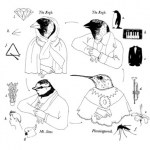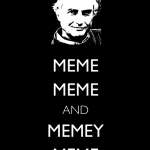Culture
Jobless Turn to Family for Help, Often With Complications:
More than half of the respondents to a recent New York Times/CBS News poll of 708 unemployed adults nationwide said they had borrowed money from friends or relatives. In most cases, their financial pictures were bleak. Nearly 80 percent of those who reported borrowing money said their family's financial situation was "fairly bad" or "very bad," a significantly greater proportion than among those who had not had to borrow.
The numbers here might exaggerate the effect some, as an individual who is going through financial turmoil may…
The music from the Darwin Electro-Opera I mentioned a while back is now available for free, streaming on Pitchfork!
(via Nick)
The New York Times Magazine has a long profile of an American from Alabama, Omar Hammami, who is now fighting for the Islamists in Somalia, The Jihadist Next Door. The optics of his family background seem tailor-made for a compelling narrative (or a TV-movie). A father who is a Syrian immigrant, a standard-issue American Muslim and professional. A mother who is a Southern Baptist and native Alabaman. The childhood is framed as "torn-between-two-worlds." Both his parents were members of exclusive religious traditions. Apparently Omar's was raised in both his parents' religions, and both sides…
Mike the Mad Biologist points me to an interesting article in Wired, Uranium Is So Last Century -- Enter Thorium, the New Green Nuke. Of course Wired is a booster of many things which never take off, but in general I think it's probably safe to bet on nuclear power becoming more prominent in the near-to-medium-future. I recently have been reading a bit about oil, stuff that's not written by Daniel Yergen, and was fascinated by this chart of long term crude prices:
The inflation adjusted values are of interest. But look at the lack of volatility before 1974! My whole life has been…
I sort of love the "KEEP CALM AND CARRY ON" posters that have become the darling of interior decorating bloggers and graphic design jokesters alike in the past few years. I even have one of the posters hanging in my apartment. Then I saw Merlin's version.
At first I LOLed, and then I was like "huh." How did we get here? How did this meme evolve from stoic World War II propaganda to hilarious Richard Dawkins jokes?
And thus, the phylogenetic tree of "KEEP CALM AND CARRY ON" posters was born:
High res here.
There's a funny article over at H+ magazine called "Get Naked: It's Good for Your Brain," telling us exactly that:
Clothing is crushing us! Trapped in tomb-like textiles, we exile our flesh from experiencing the environment. We atrophy the majority of our epidermis. If you put a plaster cast on a broken arm, the skin starves for Vitamin D; muscles weaken due to strangled range of motion; nerve synapses depress to a whimper of their former joy. Twenty-first century hominids shroud the entire skin palette, obliterating symbiosis with the planet except via face, neck and hands. (Burqa-clad…
As a follow up to the previous post, here's some of the raw data for the ARIS. I sorted by "Nones" for 2008.
None '90 None '08 Christian '90 Christian '08 Δ Christian Δ None VT 13 34 84 55 -29 21 NH 9 29 85 62 -23 20 WY 14 28 74 67 -7 14 ME 11 25 85 69 -16 14 WA 15 25 79 64 -15 10 NV 14 24 80 64…
Barry Kosmin at CUNY has published the results of three surveys of American religion since 1990. These "American Religious Identification Surveys" (ARIS) were done in 1990, another in 2001, and finally in 2008. One of the major findings of the ARIS has been the rise of those who avow "No Religion". Looking through the data it is also clear that aggregating nationally understates some of the local changes. In 1990 47% Vermonters were non-Catholic Christians (i.e., Protestants). In 2008 29% were. In 1990 13% of Vermonters had No Religion. In 2008 34% of Vermonters had No Religion! In fact, No…
Cooperation and altruism are widespread in biology, from molecules and genes working together in a cell, to bacterial communities that require coordinated behavior to survive in a tough environment, to human relationships and societies. Our human cultural perspective (perhaps even more specifically our American cultural perspective, focused as it is on individuality, free markets, and the American Dream), however, treats cooperation as an outright anomaly that has to be explained away by science (or often, religion). If natural selection is about the "survival of the fittest" how can a…
I noticed that Mongol: The Rise of Genghis Khan was watchable online on Netflix the other day, so I checked it out. I liked it. As any movie there were liberties taken with aspects of Genghis Khan's biography, but I felt like most of them were true to the general outlines of what really happened. The main downside was the whole warlord-with-a-heart-of-gold element to his personality. I'm definitely looking forward to The Great Khan, the rumored sequel.
James Patterson Inc.:
TO MAINTAIN HIS frenetic pace of production, Patterson now uses co-authors for nearly all of his books. He is part executive producer, part head writer, setting out the vision for each book or series and then ensuring that his writers stay the course. This kind of collaboration is second nature to Patterson from his advertising days, and it's certainly common in other creative industries, including television. But writing a novel is not the same thing as coming up with jokes for David Letterman or plotting an episode of "24." Books, at least in their traditional…
I'm getting considerably more email from people I don't know these days, which has me wondering about the ways people address one another. Hence, a poll:
You are writing an email to a person you have never met before, who you know to be employed by a college or university. What salutation do you use?(survey software)
All of the serious answers are risky:
1) Not all doctors are professors.
2) Not all professors are doctors.
3) Some misters and mizzes strongly prefer to be doctors or professors.
4) Many people react poorly to the automatic first-name basis.
5) Some dawgs you shouldn't "Hey."…
Modern day biological engineering and artificial life research focuses on the microscopic, the molecular, the informational, the stuff of the scientific revolutions of the past one hundred years. Our current synthetic biologies aim to turn the living into the designed, the wet into the computational, the complex into the understandable. In the 1700's, the interplay between the living and the mechanical was reversed; engineers were trying to make machines look and feel more like living things--soft, flexible, moist. Studying these historical artificial life technologies provide a valuable…
tags: neurobiology, The Neurons that Shaped Civilization, mirror neurons, Ghandi neurons, social behavior, Lamarkian evolution, Darwinian evolution, VS Ramachandran, TEDTalks, streaming video
Neuroscientist Vilayanur Ramachandran outlines the fascinating functions of mirror neurons. Only recently discovered, these neurons allow us to learn complex social behaviors, some of which formed the foundations of human civilization as we know it.
TEDTalks is a daily video podcast of the best talks and performances from the TED Conference, where the world's leading thinkers and doers give the talk of…
Another idea, Professor Is a Label That Leans to the Left:
The overwhelmingly liberal tilt of university professors has been explained by everything from outright bias to higher I.Q. scores. Now new research suggests that critics may have been asking the wrong question. Instead of looking at why most professors are liberal, they should ask why so many liberals -- and so few conservatives -- want to be professors.
A pair of sociologists think they may have an answer: typecasting. Conjure up the classic image of a humanities or social sciences professor, the fields where the imbalance is…
That's what New York Magazine is reporting. By spring. I've actually paid for online content before, but generally have let my subscriptions lapse because the net has so much information that it didn't seem worth it. It seems likely that Google News and other aggregators will be the big winner out of this. In many areas The New York Times does have better content (e.g., Carl Zimmer's articles), but the big difference from other newspapers is the breadth of their coverage. It's one-stop-shopping, and most aggregators don't offer much of an advantage. With a price differential they may.
All…
I was doing some exploring of the effect of a transition to agriculture on human height. Until the past few centuries humans were much shorter than they had been during the Ice Age. In the process I came upon some interesting data. Height, health, and development:
Adult height is determined by genetic potential and by net nutrition, the balance between food intake and the demands on it, including the demands of disease, most importantly during early childhood. Historians have made effective use of recorded heights to indicate living standards, in both health and income, for periods where…
On The Primate Diaries, Eric Michael Johnson deconstructs "social Darwinism" in order to "raise some questions about the usefulness of [the term] and the way it has been applied." The concept has little to do with Charles Darwin, but it has often been misapplied to his idea of natural selection. Instead, social Darwinism springs from the sociology of Herbert Spencer, the man who coined the term "survival of the fittest" and believed the poor should be left alone and not aided by the government. From there, things get even murkier--in the 20th century the term "social Darwinist" was applied…



